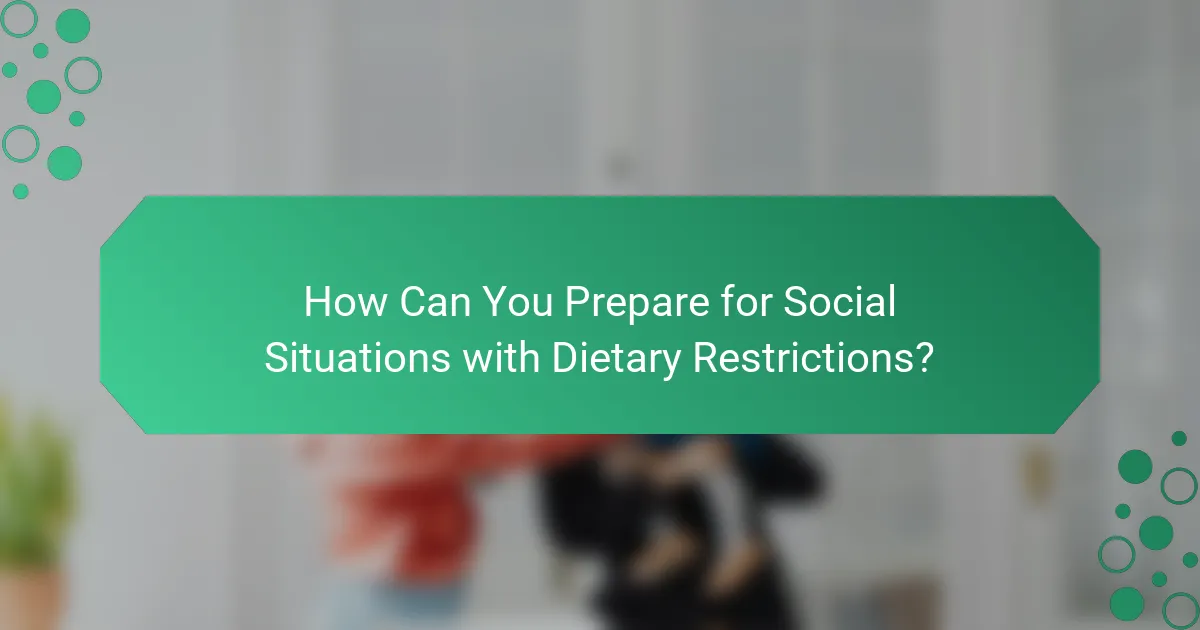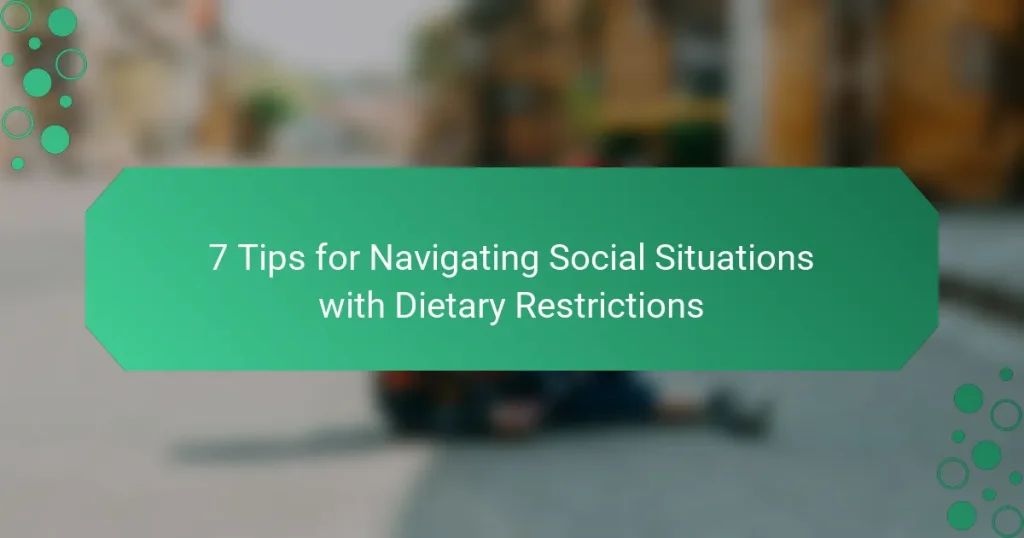Navigating social situations with dietary restrictions can be challenging, but with the right preparation and communication, you can enjoy these gatherings without compromising your health. By understanding your options and expressing your needs clearly, you can enhance your experience and minimize any discomfort. Here are seven tips to help you confidently manage social events while adhering to your dietary requirements.

How Can You Prepare for Social Situations with Dietary Restrictions?
Preparing for social situations with dietary restrictions involves understanding your options and communicating effectively. By taking proactive steps, you can enjoy social gatherings without compromising your dietary needs.
Research the menu in advance
Before attending an event, check if the menu is available online or ask the host for details. Knowing what food will be served allows you to identify suitable options or potential issues with your dietary restrictions.
If the menu is limited or does not meet your needs, consider suggesting alternatives that could be easily incorporated. This not only helps you but also assists the host in accommodating guests with similar restrictions.
Communicate your needs to the host
Be open and honest with the host about your dietary restrictions as soon as possible. This allows them to plan accordingly and ensures that you won’t be left without options during the event.
When discussing your needs, provide specific examples of what you can and cannot eat. This clarity helps the host understand how to best accommodate you and can prevent any misunderstandings.
Bring your own food if necessary
If you anticipate that your dietary needs may not be met, consider bringing your own food. This can be a simple dish that you enjoy and can share with others, ensuring you have something to eat while also contributing to the meal.
When bringing your own food, make sure to package it attractively and label it clearly. This not only shows consideration for the host but also encourages others to try your dish, fostering a more inclusive atmosphere.

What Strategies Help in Navigating Social Events?
To effectively navigate social events with dietary restrictions, preparation and communication are key. Understanding your needs and being ready to express them can enhance your experience and ease potential discomfort.
Practice polite responses for inquiries
When others ask about your dietary restrictions, respond with kindness and clarity. A simple, “I have a dietary restriction due to health reasons, but I appreciate your concern,” can set a positive tone.
Consider preparing a few standard replies that you can use in various situations. This helps you feel more comfortable and confident when discussing your needs.
Focus on the social aspect, not just food
Shift your attention from food to the people around you. Engage in conversations and activities that foster connections, making the social experience more enjoyable regardless of dietary options.
Participating in games, discussions, or other interactive elements can help you feel included and valued, even if the food choices are limited.
Suggest alternative dining options
If you know the event will have limited food choices, propose alternative dining options in advance. This could include suggesting a restaurant that accommodates various dietary needs or offering to bring a dish to share.
Being proactive about food arrangements not only helps you but can also educate others about dietary restrictions, fostering a more inclusive environment for everyone.

How Do You Handle Questions About Your Dietary Choices?
Handling questions about your dietary choices requires a balance of honesty and sensitivity. It’s important to communicate your needs clearly while considering the feelings of others involved in the conversation.
Be honest yet tactful
When asked about your dietary choices, honesty is crucial. Clearly explain your restrictions, whether they stem from health, ethical, or personal reasons. However, be tactful in your delivery to avoid making others uncomfortable.
For instance, instead of saying, “I can’t eat that,” you might say, “I have a dietary restriction that prevents me from enjoying that dish.” This approach maintains transparency while being considerate of the social setting.
Share your reasons if comfortable
If you’re comfortable, sharing the reasons behind your dietary choices can foster understanding and support. For example, you might explain that you avoid gluten due to celiac disease or that you choose a vegan diet for ethical reasons.
Keep your explanation brief and to the point. This can help others appreciate your perspective and may even encourage them to be more mindful of their own food choices.
Redirect the conversation to other topics
If questions about your dietary choices become overwhelming, it’s perfectly acceptable to redirect the conversation. Shift the focus to a different topic that interests everyone, such as recent events or shared hobbies.
You can say something like, “I appreciate your curiosity! Speaking of food, have you tried that new restaurant downtown?” This not only eases the pressure but also keeps the social interaction enjoyable for all parties involved.

What Are the Best Foods to Bring to Social Gatherings?
Bringing the right foods to social gatherings can help ensure that everyone, including those with dietary restrictions, can enjoy the event. Focus on allergen-free options, popular dishes, and a variety of choices to accommodate different needs.
Pack allergen-free snacks
When selecting snacks, prioritize allergen-free options to create an inclusive environment. Consider items like vegetable platters, fruit skewers, or popcorn, which are generally safe for most dietary restrictions. Always check labels for potential allergens and avoid cross-contamination.
Homemade treats, such as energy balls made from oats and nut-free butter, can be a hit while being mindful of allergies. Clearly label any homemade items to inform guests about their ingredients.
Choose crowd-pleasing dishes
Opt for dishes that are widely enjoyed and easy to share, such as pasta salads, tacos, or sliders. These options can often be adapted to fit various dietary needs, making them versatile for gatherings. For example, a taco bar allows guests to customize their meals according to their preferences.
Consider including a signature dish that reflects the theme of the gathering, ensuring it appeals to a broad audience. Dishes that can be served warm or at room temperature are often more convenient for social settings.
Include options for various dietary needs
To accommodate different dietary requirements, aim to provide vegetarian, vegan, gluten-free, and low-carb options. This variety ensures that all guests feel considered and can partake in the meal. For instance, offering a quinoa salad alongside a traditional pasta salad can cater to both gluten-free and carb-conscious attendees.
Label each dish clearly to indicate its dietary suitability, helping guests make informed choices. A small sign or tag can go a long way in preventing confusion and ensuring everyone enjoys the food without worry.

How Can You Encourage Inclusivity in Social Settings?
Encouraging inclusivity in social settings involves creating an environment where everyone feels welcome and accommodated, especially those with dietary restrictions. This can be achieved through thoughtful planning and open communication with guests about their needs.
Suggest inclusive menu options
When planning a gathering, consider suggesting menu options that cater to various dietary needs, such as vegetarian, vegan, gluten-free, and allergen-free choices. This ensures that all guests have something to enjoy, promoting a sense of belonging.
For example, you might offer a salad bar with a variety of toppings, a selection of dips and vegetables, or a main dish that can be easily modified. Providing clear labels for each dish can also help guests make informed choices.
Educate friends about dietary restrictions
Educating friends about dietary restrictions can foster understanding and support within your social circle. Share information about common dietary needs, such as lactose intolerance or nut allergies, and explain how these can impact individuals.
Encourage open discussions about food preferences and restrictions before events. This can help alleviate any concerns and ensure that everyone feels comfortable and included. A simple conversation can go a long way in promoting awareness and empathy.

What Are Common Mistakes to Avoid?
When navigating social situations with dietary restrictions, it’s crucial to avoid assumptions about food safety. Many people mistakenly believe that all food is safe or that their dietary needs are obvious to others, which can lead to uncomfortable situations.
Don’t assume all food is safe
One of the biggest mistakes is assuming that all food options are safe for your dietary needs. Ingredients can vary widely between dishes, and cross-contamination is a real risk, especially in shared kitchens or buffets. Always inquire about specific ingredients and preparation methods.
For example, a dish labeled as “vegetarian” may still contain animal-derived products like cheese or broth. If you have allergies or strict dietary restrictions, it’s essential to ask questions rather than relying on labels or appearances.
When attending events, consider bringing your own snacks or dishes that you know are safe. This not only ensures you have something to eat but also helps you avoid potential pitfalls in unfamiliar food environments.


